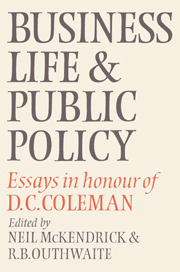Book contents
- Frontmatter
- Contents
- Preface
- List of contributors
- 1 Piscatorial politics in the early Parliaments of Elizabeth I
- 2 Marriage as business: opinions on the rise in aristocratic bridal portions in early modern England
- 3 Age and accumulation in the London business community, 1665–1720
- 4 The use and abuse of credit in eighteenth-century England
- 5 Convicts, commerce and sovereignty: the forces behind the early settlement of Australia
- 6 ‘Gentleman and Players’ revisited: the gentlemanly ideal, the business ideal and the professional ideal in English literary culture
- 7 The City, entrepreneurship and insurance: two pioneers in invisible exports – the Phoenix Fire Office and the Royal of Liverpool, 1800–90
- 8 ‘At the head of all the new professions’: the engineer in Victorian society
- 9 Bernard Shaw, Bertold Brecht and the businessman in literature
- 10 Lost opportunities: British business and businessmen during the First World War
- 11 Ideology or pragmatism? The nationalization of coal, 1916–46
- Bibliography of D. C. Coleman's published works
- Index
2 - Marriage as business: opinions on the rise in aristocratic bridal portions in early modern England
Published online by Cambridge University Press: 07 October 2009
- Frontmatter
- Contents
- Preface
- List of contributors
- 1 Piscatorial politics in the early Parliaments of Elizabeth I
- 2 Marriage as business: opinions on the rise in aristocratic bridal portions in early modern England
- 3 Age and accumulation in the London business community, 1665–1720
- 4 The use and abuse of credit in eighteenth-century England
- 5 Convicts, commerce and sovereignty: the forces behind the early settlement of Australia
- 6 ‘Gentleman and Players’ revisited: the gentlemanly ideal, the business ideal and the professional ideal in English literary culture
- 7 The City, entrepreneurship and insurance: two pioneers in invisible exports – the Phoenix Fire Office and the Royal of Liverpool, 1800–90
- 8 ‘At the head of all the new professions’: the engineer in Victorian society
- 9 Bernard Shaw, Bertold Brecht and the businessman in literature
- 10 Lost opportunities: British business and businessmen during the First World War
- 11 Ideology or pragmatism? The nationalization of coal, 1916–46
- Bibliography of D. C. Coleman's published works
- Index
Summary
In case it should be thought that an essay on marriage is an anomaly in a volume of studies devoted largely to the worlds of economic policy and business, let us begin with a remark on courtship in general made by the eminent American sociologist, W. J. Goode:
All courtship systems are market or exchange systems. They differ from one another with respect to who does the buying and selling, which characteristics are more or less valuable in that market, and how open or explicit the bargaining is.
Few would deny that market systems come squarely within the province of the economic historian and there can be little doubt also that amongst the upper classes in sixteenth- and seventeenth-century England the bargaining was extremely open and explicit. Irrespective of the role of romance in either initiating or concluding courtship, marriage negotiations at this social level almost invariably took on eventually the appearance of business transactions. Negotiators corresponded on behalf of their courting clients like solemn commercial diplomats, agreements were eventually formalized in private treaties – the marriage contract – and financial considerations seem frequently to override sentiment. Pecuniary obsessions sometimes spilled over into the marriage itself. Nowhere is this better illustrated than in the letter which Eliza Spencer wrote in 1610 to her husband of perhaps ten years' standing, William Lord Compton, who had just got his hands on the fortune of Eliza's father, city magnate Sir John Spencer, reputedly the richest commoner in England.
- Type
- Chapter
- Information
- Business Life and Public PolicyEssays in Honour of D. C. Coleman, pp. 21 - 37Publisher: Cambridge University PressPrint publication year: 1986
- 2
- Cited by



